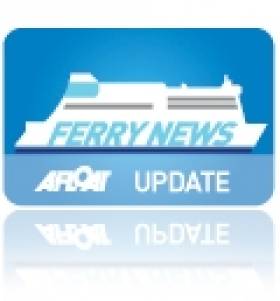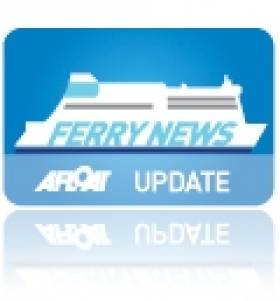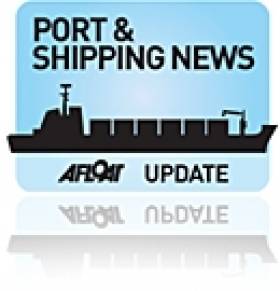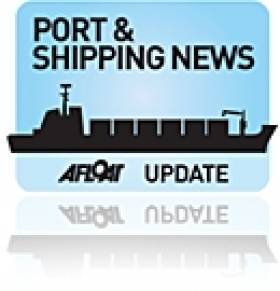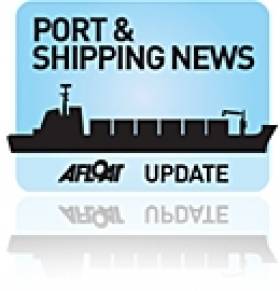Displaying items by tag: South Korea
36 Years In Jail For 'Sewol' Ferry Tragedy Captain
#Sewol - The captain of the ferry that capsized off mainland South Korea earlier this year, costing the lives of 304 people on board, has received a 36-year jail sentence for his part in the disaster.
But as RTÉ News reports, Capt Lee Jun-Seok was also acquitted of the murder of those who died in the incident on 16 April, from which just 172 of the 476 passengers and crew were rescued.
The court ruling that prosecutors had failed to prove the most serious charge, of "homicide through wilful negligence", which carries the death penalty.
Capt Lee's sentence comes after similarly lengthy terms handed down to three other senior crew members on the Sewol, which sank some 100km off the mainland on route to the popular tourist island of Jeju, as previously reported on Afloat.ie.
Most of those killed in the tragedy were high school students going on a field trip to the island – and controversy grew in the weeks after the incident as it emerged passengers were instructed to remain in their cabins despite the boat sinking rapidly.
RTÉ News has more on the story HERE.
Two Dead As Ferry Sinks Off South Korea
#SouthKorea - At least two people have died, with some 300 still unaccounted for, after a ferry capsized and sank 100km off the coast of mainland South Korea yesterday (Tuesday 15 April).
According to RTÉ News, the passenger and car ferry Sewol began to list to port as it approached the island of Jeju and sank quickly.
A rescue operation is still underway, with some 160 passengers confirmed safe so far.
Weather conditions at the time are reported to have been fair, with calm seas.
The 20-year-old vessel was reportedly carrying 150 vehicles and 475 people, including a number of high school students and teachers on a field trip to the island, a popular tourist spot in the east Asian country.
South Korea in general is also a top destination for young Irish people teaching English as a second language to school-age children. It is unknown if any Irish people were on board the ferry.
RTÉ News has more on the story HERE.
Speaking at the ceremony Mr. Murphy commented: "d'Amico Group are one of a leading number of firms that are driving investment in this sector in Ireland which is contributing to new employment and growth opportunities".
Entry of the new dry-bulkers marks another important chapter in the d'Amico Group's development since it established its Irish office in 2002, as the vessels are managed from its Dublin office under the Irish Tonnage Tax (ITT) regime.
Four more newbuilds are under construction in Korea, scheduled for delivery in 2012, and two under construction in Japan which are due in 2013. The latter ships represent a further investment in excess of US $310 million to the Italian company that began and grew as a family business in 1936.
To read more about this logon to the IMDO website and also www.damicoship.com
Expanding Fleet at Ardmore Shipping
The newbuilds contracts are for a pair of 17,000 deadweight tonnes (dwt) chemical tankers which will be IMO II classified. The 144m twins have a beam of over 22m and a draft of 9m and they will be around 9,000 gross tonnes.
Both the newbuilds were ordered from the Hamburg-based Hellespont in 2009 and are the last in a series of eight tankers being built by the Sekwang Shipbuilding facility in South Korea. The newbuilds are expected to be delivered in April and July 2012.
In the second separate deal Ardmore Shipping has agreed to charter the Hellespont Commander and Hellespont Crusader (photo) which are also 17,000 dwt IMO II chemical tankers for a one year period with an option to extend the charter for a further year. The 2010 built vessels will enter the Navig8 Brizo-8 chemical tanker pool for trade and commodity chemicals.
Anthony Gurnee, CEO of Ardmore Shipping Ltd, commented: "We are very pleased to have taken on the contracts with Sekwang Shipbuilding for these two newbuild vessels, which will join our fleet next year, and with our charter agreement for the Hellespont Commander and the Hellespont Crusader."
The chartered vessels join the Ardmore Shipping which brings the fleet to six ships which include: Ardmore Centurion, Ardmore Seatrader, Ardmore Seamaster and Ardmore Seafarer.
When the two newbuild vessels enter service in 2012, Ardmore Shipping will still be in expansive mode as they have ordered two 51,000 dwt double hull IMO III chemical/product tankers for delivery in 2012 and 2013.
South Korean Newbuilds for Arklow Shipping
The latest newbuild for the Arklow Shipping Ltd (ASL) fleet, Arklow Meadow is due to depart from the Mokpo Shipyard Corporation, South Korea in three weeks, writes Jehan Ashmore. The 136m dry-cargo vessel will seek a cargo for the delivery voyage from the Far-Eastern shipyard to Europe.
Arklow Meadow represents the fourth in a series of six newbuilds ordered, with lead-ship Arklow Manor entering service in 2009. The following newbuilds, Arklow Marsh and Arklow Mill where delivered from the shipyard to her owners during 2010.
All the 'M'-class newbuilds are 14,000 tonnes and have four-holds with a total grain capacity of over 18,000 cubic square-metres.The vessels are powered by a MaK 6M 43C main engine which has a 5,400KW capacity through a Jake reduction gear-box and fitted to a Rolls Royce controllable pitch propeller.
ASL operate a modern fleet of dry-cargo short-sea traders and bulkers throughout Europe, Scandinavia and to the Mediterranean Sea using tonnage varying in size from 3,000-14,000 tonnes. Most to the vessels are of a singledeck, box hold design and some are fitted for container stowage. The majority of cargoes are grain, general dry-bulk and bulk commodities including those classified under IMO regulations.
ASL was established in 1966 by several family ship-owning companies and has progressed to become one of Ireland's leading indigenous ship-operators. The company has its headquarters alongside the banks of the River Avoca, Arklow in addition a management team also based in the Netherlands. Most of the 39 strong fleet are registered in the Co. Wicklow port, flying the Irish tricolour while the rest of the fleet are under the Dutch flag and registered at Rotterdam and Zaandam.


























